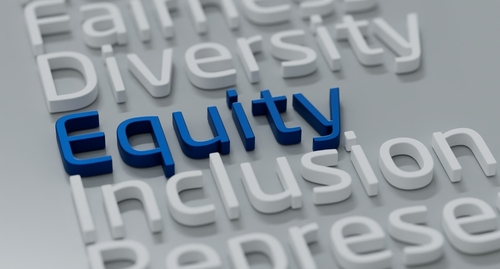There’s no doubt about the benefits of diversity, equity, and inclusion (DEI) for organizational success. Studies have proven that equity-informed organizations have more engaged employees, better retention rates, and higher earning potential. These facts have made DEI one of the hottest buzzwords in business over the past decade. The challenge for many leaders has been finding strategies, frameworks, and practices that produce meaningful and sustainable change for equity.
While office potlucks and public equity statements may signal an organization’s desire to be equitable, these initiatives do little to create the cultural shift required to create an organization where equity-deserving staff and clients thrive. To move beyond these hollow promises and token gestures, organizations must be intentional and strategic about prioritizing equity.
Here are four practical steps leaders can take to turn their commitments into measurable change:
Start with Data
Equity is about eliminating disproportionalities and disparities. We can only do that if we understand which groups are experiencing consistently bad outcomes, and that requires data. If your organization collects disaggregated identity-based data about its employees (like race, gender, sexuality, religion, ability, and age), you can identify which groups are having less favorable experiences.
Some good metrics for data collection include promotion, retention, engagement, discipline, harassment, and wages. Using indicators like these with disaggregated identity-based data produces a clear picture of the disparities happening within the organization. For example, data can reveal issues like the underrepresentation of black staff in leadership or a wage gap between male and female employees. This type of information is critical to understanding where equity efforts should be focused.
Tailor Your Strategy
Organizations often adopt a one-size-fits-all approach to equity, implementing frameworks and practices without first understanding the problems they need to solve. For instance, many companies hired more black professionals in the wake of the 2020 Black Lives Matter protests, focusing on increasing the diversity of their staff. However, some companies struggled to retain these employees because they hadn’t addressed anti-black racism in their policies.
These missteps can be avoided by using data to create an equity strategy that addresses the specific issues happening in your organization. Specificity allows you to critically examine your company’s policies and practices to understand how they’ve contributed to existing inequities. You can then make the appropriate revisions and apply the right frameworks to create change.
Incentivize Equitable Behavior
When working toward more equitable outcomes, policy is an excellent place to start, but it’s not enough. An equity-informed culture is essential, too. Organizational culture determines what behaviors are accepted and encouraged. It shapes the way staff show up in their roles, how they behave toward colleagues and clients, and what they value and prioritize in their work. If equity isn’t part of your culture, equity-informed policies won’t matter.
To shift your organizational culture for equity, you must incentivize equitable behavior and issue consequences for actions that don’t align with your DEI commitments. This could include making equity a part of your employees’ performance reviews. You should also provide clear mechanisms for accountability when inequitable behavior happens—whether those actions were taken by a frontline worker or the CEO. These practices support the creation of a culture where equity is the norm and the standard.
Monitor, Analyze, Revise
The only way to know if a business strategy is working is to track and analyze data and monitor progress. The same is true for equity strategies. Data collection should be a consistent part of your organization’s DEI work. This allows you to see if your efforts have led to more equitable outcomes for impacted staff. Consider the example of the underrepresentation of black staff in leadership. Data monitoring and analysis at regular intervals would allow you to see if your strategies have led to an increase in black professionals in leadership roles.
If your efforts haven’t yielded positive results, your data analysis can guide you in revising your approach. However, that doesn’t mean more equitable outcomes signal an end to your DEI journey. Equity work is an ongoing commitment that requires continuous effort. Collecting, monitoring, and analyzing equity data at regular intervals ensures you remain aware of existing and new inequities in your organization and can craft and refine your strategy accordingly.
Equity work is exactly what the name suggests: work. The public gestures we’ve come to associate with DEI initiatives are only a small part of that effort. If you want your DEI commitments to produce equitable outcomes, you must be prepared to treat this work with the same dedication and gravitas you bring to other parts of your business.
Kike Ojo-Thompson is an anti-racism and anti-black racism educator, speaker, and organizational change facilitator. She’s also the founder and CEO of Toronto-based KOJO Institute, a leader in equity consulting.

